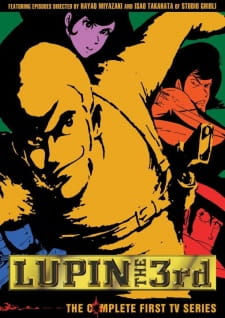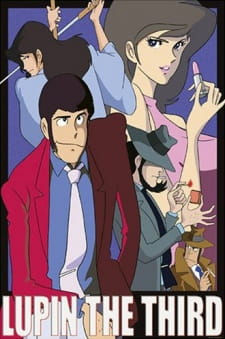Lupin the third Part 1 - Fun heists and gripping emotion (sometimes)
- Stephanie
- 27. feb. 2020
- 4 min lesing
I really like comedy drama series. A mix of hilarity and intense emotion? What more could you want? However, it's not as easy as it sounds. Many comedy drama series often fall flat on their face, although that is not what I'm going to discuss today. While a comedy drama series like Ashita no Joe leans heavily on the drama aspect, only occasionally focusing more on the comedy, there are some series that decide to go in the opposite direction. One of these series is Rupan Sansei, or as it's better known, Lupin the Third. Now, there are a lot of Lupin installments, so to give some more focus to this post so I don't bite off more than I can chew again, I'll only be discussing the first Lupin TV anime, as well as the original manga.

Lupin is about, well, Lupin. He's the third ancestor of famous thief Aresene Lupin, he himself a thief and a master of disguise, the best there is. With him is his best friend Jigen, the sharpshooter. There's also Goemon, a master swordsman, and Fujiko Mine, a mysterious woman who never gives up a chance to backstab Lupin whenever she has the chance. Together, the four of them, or any combination of them, commmit crimes, shoot guns and drive cars. There's also Zenigata, a detective who has dedicated his entire life to no other purpose than to capture Lupin.
Lupin is quite an interesting case when it comes its adaptation. While the manga is very dark, and often even has Lupin commit murder, torture and the like, the anime is a lot more lighthearted. The worst thing that happens to anyone is that they fall over after getting hit by a bullet. And honestly, I think it's for the better. The lighthearted tone suits the character designs better, although I do think a more tonally dark Lupin series could be good, as this is more just a case of the adaptation succeding in doing something different rather than it is a case of the original being "bad." One of the highlights of the anime is the voice acting, and it is absolutely delightful to listen to. It really helps reinforce the lighthearted tone of the adaptation, and while looking through Yamada Yasuo's (Lupin's seiyuu) MAL page, I was really saddened to see that he died at 62, because he did an absolutely perfect job at bringing the character to life. It's actually really interesting to look through the careers of the different seiyuu who worked on the TV adaptation, because sadly, most of them had really short lived careers. Fujiko Mine's seiyuu, Yukiko Nikaido only had two other roles in anime, ever. Even though her performance in Lupin is superb! Goemon's VA would never reprise his role, although Zenigata's did.

As Lupin is an episodic series, one may wonder just exactly how good the episodic stories are. Sadly, this is no Kino no Tabi 03, it's a little bit more hit and miss than that. The episodes that deal with more supernatural elements are a lot less good than the ones who are more down to earth. I'd say this is because whenever the show attemps to do something supernatural, the explanation never feels satisfying. To give an example: The episode starts with the supernatural element being introduced, Lupin and the gang are helpless and unable to do anything about it, they then figure it out, and they beat the bad guy. The problem here is simply that the explanation stage doesn't make any sense. They just figure it out. How? Oh, Lupin just happened to get his hands on some secret information that explains it perfectly. But it doesn't explain it perfectly, and therefore, feels unsatisfying. I don't know a why to fix this, but honestly? I think just removing the supernatural elements would be a lot better. No time machines, no fourth dimension, and no shooting fire from your fingertips. Just keep it small time and simple.
The fact that it's a comedy drama is a very interesting dynamic to play without, although the comedy isn't always that funny. The best episode, episode 21, is mostly dramatic, with very little focus on comedy, save for the escape sequence at the end. The episode actually has a lot of emotional weight, and manages to do so without any buildup or foreshadowing from earlier episodes. The explanation for why Lupin and Jigen are doing what they're doing feels realistic, even if the characters who caused this situation are never seen from again. Indeed, episode 21 is episodic storytelling at it's best. Sadly, most episodes aren't really like that, in fact episode 21 is the only one which manages to outdo itself like this. Most episodes are just average really, but the few ones that are memorable such as episode 23 and episode 5, are pretty good, and definetely help raise the quality of the show.
In conclusion, Lupin the Third is a really good and short TV series. While I haven't consumed any of it's numerous sequels or spinoffs yet, I do feel confident that I will enjoy them, and I definetely reccomend that more people check the series out. It's probably not meant to be binged though, but if you have 20 minutes free sometime, check out an episode, maybe even two if you feel up for it. I think it such a viewing experience would be pretty darn enjoyable.




Kommentarer